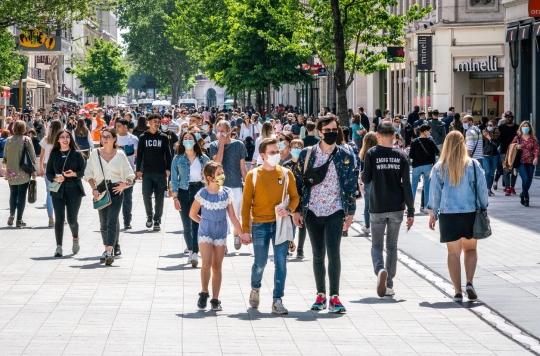In its latest epidemiological point on Covid-19 in France, Public Health France observes that in terms of prevention the French seem to be tired of barrier gestures while wearing a mask is gaining in popularity. Explanations.

- According to a survey by Public Health France, the systematic use of barrier gestures remains in the majority.
- However, these measures have experienced a strong erosion since the end of March. Particularly marked wear in late May and early June.
- Against this global trend, wearing a mask in public follows the opposite progression and is today the most systematically applied measure according to the declarations. However, recourses are multiplying to restrict this obligation outdoors.
Not kissing, keeping 1m away or wearing a mask, gestures that have burst into the daily life of the French since the start of the pandemic in France in mid-March. The Coviprev survey, launched by Public Health France, measures the evolution of behavior and mental health according to independent non-probability samples. According to this study, nine months after this changeover, the majority of French people claim to systematically adopt preventive measures against Covid-19 contamination.
However, this adhesion clearly crumbles as the weeks pass. While between March 30 and April 1, 92% claimed to respect the measure “greet without shaking hands and stop hugging”, they were only 66% at the end of August, a drop of 28% in systematic use. of this rule. “Keep a distance of at least 1m” decreases by 30% during these 5 months. At the end of March, respondents said they applied it at 84% compared to 54% at the end of August. Significant erosion particularly marked between the end of May and the beginning of June. A holiday effect which has also reduced systematic compliance with “washing your hands regularly” measures (-11% between March and August, 65.9% of systematic use declared at the end of August), “coughing into your elbow” (change in -10% in 5 months, for 61.1% of systematic application declared at the end of the summer) and “use a single-use tissue” (-11% since the start of the pandemic, 59.1% of people say they do it systematically at the end of August).
Masks: popular but also contested
Surprisingly, adherence to barrier gestures, yet the only measures recommended to combat the spread of the pandemic by the World Health Organization (WHO), is crumbling while that of wearing a mask is doing the opposite. . What is visible reassures more than immaterial gestures? May be. At the end of March in full confinement, 15% of those polled assured that they systematically wear a mask in public. A proportion which has continued to soar, including after deconfinement, until the end of May. There 53.9% of people claim to wear it systematically but wear and tear also seems to reach this extent where it stagnates until the end of June around the majority of French people. Then at the end of July, the wearing of the systematic mask experienced a surge until it imposed itself in front of all the barrier gestures as being the most systematically applied at 68.6% at the end of the summer. Mirroring this, between 38 and 46% of French people say they do not systematically comply with one of these measures.
A new appeal in Strasbourg
However, if the mask is gaining in popularity, the fact that it is imposed in certain outdoor spaces remains a subject of tension. Thus, after two referrals to the administrative courts and the Council of State last week, a new Strasbourg collective went to court again, Friday, September 11, against the last decree in progress – however modified following the decision of the Council of state. The prefect has made it compulsory to wear a mask throughout Strasbourg as well as in “high density areas” in the other cities of the department. The applicants who reproach for not clearly defining these spaces and accuse it of infringing “fundamental freedoms and non-respect of private life” assures Me Jantkowiak to 20 minutes.
.

















